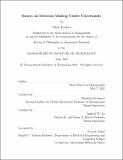Essays on Decision Making Under Uncertainty
Author(s)
Koduri, Nihal
DownloadThesis PDF (3.126Mb)
Advisor
Bertsimas, Dimitris
Lo, Andrew W.
Terms of use
Metadata
Show full item recordAbstract
In Chapter 2, "The Origin of Cooperation," we construct an evolutionary model of a population consisting of two types of interacting individuals that reproduce under random environmental conditions. We show that not only does the evolutionarily dominant behavior maximize the number of offspring of each type, it also minimizes the correlation between the number of offspring of each type, driving it towards -1. We provide several examples that illustrate how correlation can be used to explain the evolution of cooperation.
In Chapter 3, "Data-Driven Optimization: A Reproducing Kernel Hilbert Space Approach," we present two methods, based on regression in reproducing kernel Hilbert spaces, for solving an optimization problem with uncertain parameters for which we have historical data, including auxiliary data. The first method approximates the objective function and the second approximates the optimizer. We provide finite sample guarantees and prove asymptotic optimality for both methods. Computational experiments suggest that at least the second method overcomes a curse of dimensionality that afflicts existing methods, extrapolates better to unseen data, and achieves a many-fold decrease in sample complexity even for small dimensions.
In Chapter 4, "Robust Optimization with Side Data," we introduce and solve the problem of minimizing a cost function subject to constraints that depend on a vector of uncertain parameters, given historical data on the parameters, including side data. We develop two approaches to solving this problem, both involving replacing the uncertain constraints by constraints evaluated at data points. If the original problem is convex, both approaches require solving a single new convex optimization problem. We show that the degree of suboptimality and degree of constraint violation of the decision produced by both approaches converges almost surely to zero. We show that for both approaches, varying a single parameter controls the tradeoff between suboptimality and constraint violation, and in lieu of finite-sample probabilistic guarantees, we propose a cross-validation scheme for choosing the parameter to enforce the desired tradeoff. We implement both approaches and the cross-validation scheme on a wide range of computational examples and observe that both approaches produce a satisfactory decision and that the cross-validation scheme is effective in choosing the tradeoff between suboptimality and constraint violation. We also combine both approaches with prior work to form two tractable approaches to optimization under uncertainty with side data when both the objective and constraints are uncertain.
Date issued
2021-06Department
Massachusetts Institute of Technology. Operations Research CenterPublisher
Massachusetts Institute of Technology